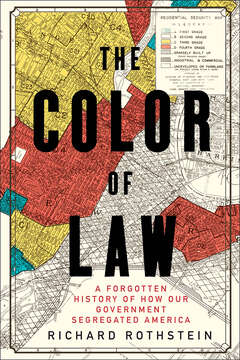This week’s selected media: February 4, 2024: The Color of Law, The Parable of the Sower, and Slavery and Freedom
This week I couldn’t use the computer much so read more than usual, including two long books and one hard-to-read one. I finished:

The Color of Law: A Forgotten History of How Our Government Segregated America, by Richard Rothstein: I confess I recorded my podcast episode with Richard before reading the book, initially motivated by my mom’s sharing (on her and my podcast episodes) about growing up in a mostly black ghetto that had been a working class neighborhood before we moved there. She talked about redlining and how government policy grew and sometimes created racial differences in wealth and income.
Richard’s book comprehensively and definitively covers the issue. It’s infuriating in many ways:
- How does American culture and our educational system not make this material standard, common knowledge?
- How could people and the government do what they did? (the book answers the logistics and motivations, but I mean existentially, and how could they silence their consciences? Again, I know the answers, but each time I answer, the next page recounts another behavior that should seem past all norms of society and they did it)
Most of all:
- How can we solve the problems these behaviors started? Tragically, many of the results anyone would consider unfair, even ardent racists, can’t be undone, or could take centuries.
- If those things felt acceptable then, what are you and I doing today that future generations will consider grossly unacceptable?
The Parable of the Sower, by Octavia Butler: I read more nonfiction than fiction. My editor at my publisher gave me this novel of a dystopic future United States where environmental degradation and social collapse have made the country third-world. I found it interesting but not much more. The introduction and cover make points about the author and main character being black women, rare for science fiction.
Slavery and Freedom: An Interpretation of the Old South, by James Oakes: When I visit Jim in his office, he gives me a different book of his. I’m close to finishing all of his. The book’s language was hard to read. I believe it would benefit from simplification, but the concepts are thought-provoking.
This one contrasts slavery in the U.S. with freedom. Normally we think of freedom as the opposite of slavery. The height of American slavery followed the Enlightenment and classical liberalism, which the Old South in many ways espoused and practiced. The Old South is the only slave culture that wasn’t independent, as Rome and other examples were, so it followed and couldn’t change the values slavery clashed with. It couldn’t help that it had to coexist with the North, which viewed slave actions like escaping and how to treat fugitives differently. Classical liberal thought both gave American slavery its unique characteristics, including being the largest slave culture in history, and led to its demise.
Read my weekly newsletter

On initiative, leadership, the environment, and burpees